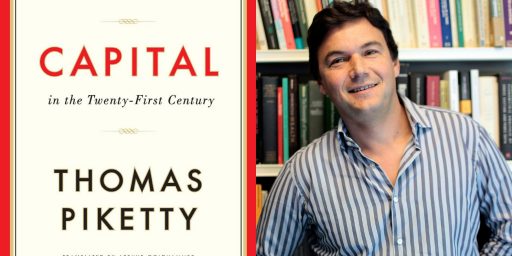Decoupling Virtue and Material Success
Andrew Sullivan has an interesting piece in The New Republic today, drawing some lessons from a flap Prince Charles got himself into for speaking the simple truth that all men are, contrary to the propaganda, not created equal.
But learning our own limits is the beginning of wisdom. Some people are simply not as intelligent as others. Some can play the piano brilliantly; others have no clue. I do not regard my own failure to play rugby for the England team as a huge injustice, although my father has yet to recover from it. The world should be glad I am not an accountant. I am not likely to become an Abercrombie and Fitch model. And if I consistently nagged and begged assorted model agencies to hire me, I would have no case. Isn’t that really what the prince was saying?
Of course, nuances matter. When the skill-difference between jobs is trivial, sometimes ability can be in the eye of the beholder. Bad management can squelch the most eager and capable of drones. But Charles is right to bemoan the notion that anyone can do anything, and that if they don’t, some injustice is somehow being perpetrated. That injustice is called life.
And this, of course, cuts to the chase of the meritocratic project. The inequalities of ability are far more crushing than the inequalities of a rigid class system. And the great mixed blessing of a democracy in which everyone has a chance at success is that inequality of results seems crueler and starker. It cannot be blamed away. We’re not there yet, of course. But you only have to read The Bell Curve (no, not its racial chapter) to see where we are headed.
An open market society with an effective educational system in an economy that increasingly values brainpower over brawn will lead inexorably to greater and greater inequality. And that inequality may be even less tolerable for those at the bottom than in days gone by. We can ameliorate this. But even if we improve the education system, the result is greater efficiency in advancing inequality. Human envy will not die. Neither will differences in human ability. And resentment will grow.
Is there any way out? The only answer, I think, is cultural and moral. We have to decouple the notion of virtue and worth from material success. I don’t think it’s an accident that we see greater emphasis on religious faith and moral values at a time when our economy is increasingly rewarding people on the brutal basis of market worth. It’s a way of correcting for inequality, by reminding people that their dignity inheres in something far more profound than their paycheck or social status.
Sullivan is right, of course. I disagree, however, with the essay’s implicit assumption that those with the highest intelligence and education are necessarily the highest paid. Stars in the sports and entertainment industries make far more money than Nobel Prize winning scientists. Successful plumbers and carpenters make more money than college professors.
Law and medicine are exceptional, in that relatively high intelligence and education levels are indeed rewarded with high salaries. In the latter case, however, that’s primarily a function of articifical scarcity. Through what amounts to collusion, the medical profession has unnecessarily limited the number of seats at medical schools to keep their services scarce. As to the former, there is certainly no shortage of attorneys in America. But the high wages they earn is mainly a function of an overregulated society that requires legal expertise at every turn–partly created by lawyer legislators and lawyer lobbyists–and a culture of incredible litigiousness. The latter is somewhat ironic in that it is what sparked Charles’ comments to begin with.





I disagree, however, with the essay’s implicit assumption that those with the highest intelligence and education are necessarily the highest paid.
Indeed, it’s this assumption that has the left so confused, just now. They are, and will be for decades, scratcing their heads trying to figure out why the voters didn’t take the advice of the highest paid among us, and vote Kerry. Who, after all, past sports figures, gets paid the most? Why artists, of course.
says Gene Veith:
I’m afraid the Sullivans of the world are going to be working this one over for a long time, never finding the answer because they’ve still not reckoned with the idea that the paycheck is not directly connected to the wisdom of it’s receiver. Sullivan, particularly reveals his liberal roots of conservative roots, here.
Thank God the voters are starting to figure it out, else the US would be waiting for a Kerry induced disaster.
And I’m a little surprised at the notion that intelligence and “occupational status” are tied. Since when did we assume that college professors are more intelligent than plumbers and carpenters?
Oh, right. Always.
There’s an even deeper bias there that the left doesn’t understand. One becomes a plumber or carpenter for a myriad of reasons, most of them unrelated to intelligence. Believe it or not, there are a lot of highly intelligent people who love to build.
Hm. It’s hard to relate to this, since my intelligence has been a handicap most of my life. I like being bright, but have yet to figure out how to make money off of it.
The number of lawyers, and the influence of the law in the U.S., are actually tied just as much to artificial scarcity as the medical profession, if not more so. The ABA has successfully insinuated intself into the political process such that (1) anybody who wants to practice law in the U.S. must go to an ABA-affiliated law school, and (2) “practicing law” is defined quite broadly in comparison to other countries. In the case I know the most about, Japan, there are only about 1500 new lawyers (bengoshi) a year, but bengoshi are typically what you think of in the U.S. as trial lawyers, who go to court relatively frequently. Lots of what in the U.S. would be ‘the practice of law’ is done by people who received undergraduate degrees in the law faculty, normally attached to the Political Science department.
One of the side results of this is that you see an artificial disassociation of non-lawyers from the law. Lawyers are thus in charge of the law, and can use that to create lawyer-friendly regulations (i.e., those that require more lawyers). This probably also contributes to a greater level of litiginous, though that’s not as straightforwardly purely an effective of the artificial restrictions imposed on states at the behest of the ABA.